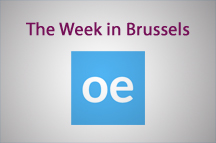 Last week’s vote in Britain to leave the EU truly shocked Brussels. Whereas many had anticipated a narrow win for "remain", as indicated by some opinion polls, not so many had realised that "narrow" also meant the “Brexit” camp could win.
Last week’s vote in Britain to leave the EU truly shocked Brussels. Whereas many had anticipated a narrow win for "remain", as indicated by some opinion polls, not so many had realised that "narrow" also meant the “Brexit” camp could win.
A whole range of reactions followed. While the six Foreign Ministers of EU "founding states" and EU Commission President Juncker sent out hostile messages, German Chancellor Angela Merkel was more conciliatory, warning there is "no need to be nasty" to the UK.
At this week’s EU Summit, EU leaders stated that “access to the single market requires acceptance of all four freedoms, including the freedom of movement”, which really should be seen more of a negotiation statement rather than a prediction. They also granted some time for the UK to figure out who’ll become PM. After that, some kind of official negotiation is due to start.
It’s still not certain that the UK will opt to use the EU procedure for member states to leave the Union, which is laid down in article 50 of the EU Treaty. The UK may be frightened by the prospect that not only ultra-federalist MEPs have a veto over this, but also that the EU controls the timetable in this procedure because, from the moment it is triggered, a period of two years starts, after which Britain automatically leaves the EU. This two-year period can however be prolonged, with the consent of each member state, which is likely, given that tariffs on UK exports which would be swiftly followed by tariffs on German or Benelux imports into the UK isn’t something the likes of Germany are looking forward to. A lot of jobs would swiftly be lost, for example in the German car manufacturing industry.
On Thursday, a bombshell hit UK politics, with the announcement of former Conservative London Mayor Boris Johnson, the most prominent campaigner for Brexit, that he wouldn’t be running to become PM. The consequences of this aren’t entirely clear yet. That Theresa May, who now looks to be the favourite to succeed David Cameron, has campaigned for “remain”, may make a deal between Britain and the EU perhaps a bit easier.
Any UK government is likely to demand restrictions on freedom of movement and market access to the EU at the same time. Given that nobody is ready for a trade war, some deal should be feasible at some point, although there may be restrictions for Britain’s financial services, as much as this would also hit investment on the Continent. It’s not so intelligent to cut of one’s financial bloodline, but Continental politicians have proven in the past to sometimes opt for politics over economics, even at great cost. The EU will at some point also need to close a deal with Switzerland on freedom of movement, given that the Swiss people have demanded this in a referendum in 2014. So far, Brussels has refused to negotiate over this, but when the Swiss are joined in their demand by the British, the EU may like to offer some kind of solution which could be applied to both, especially when the stakes are so high, given the size of trade between the UK and the EU.
Many in Britain are currently requesting a deal similar to the one Norway enjoys, which includes automatic access to the European Economic Area (EEA). When it will sink in that this means taking over a lot of EU rules automatically, which effectively reduces Parliament’s sovereignty as compared to now, while remaining under the jurisdiction of the EU’s Court of Justice in Luxembourg, it can be expected that the preferred solution will be to close a bilateral Free Trade Agreement (FTA). However, this can take years. Seven years, according to EU Council President Donald Tusk. This means Britain is unlikely to leave the EU anytime soon. Given the stakes, a deal between the EU and Britain is ultimately likely. Many proponents of Brexit will at that point claim that Britain is still a member of the EU in all but name, perhaps a stretch. Many of those who currently refuse to believe Britain won’t leave, will in any case be proven wrong. The full force of popular power in one of the world’s oldest democracies shouldn’t be underestimated.
Pieter Cleppe represents independent think tank Open Europe in Brussels.














